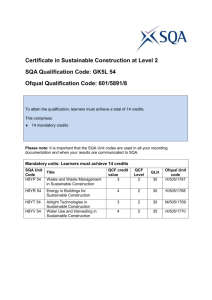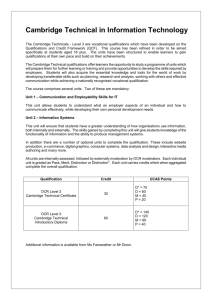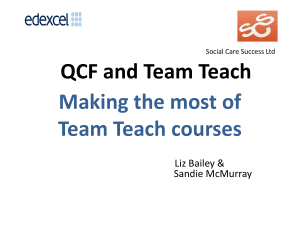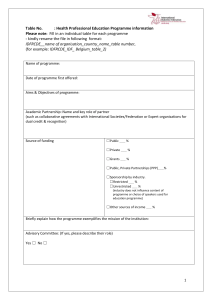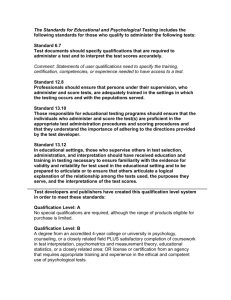Assessment Principles for First Aid Qualification
advertisement
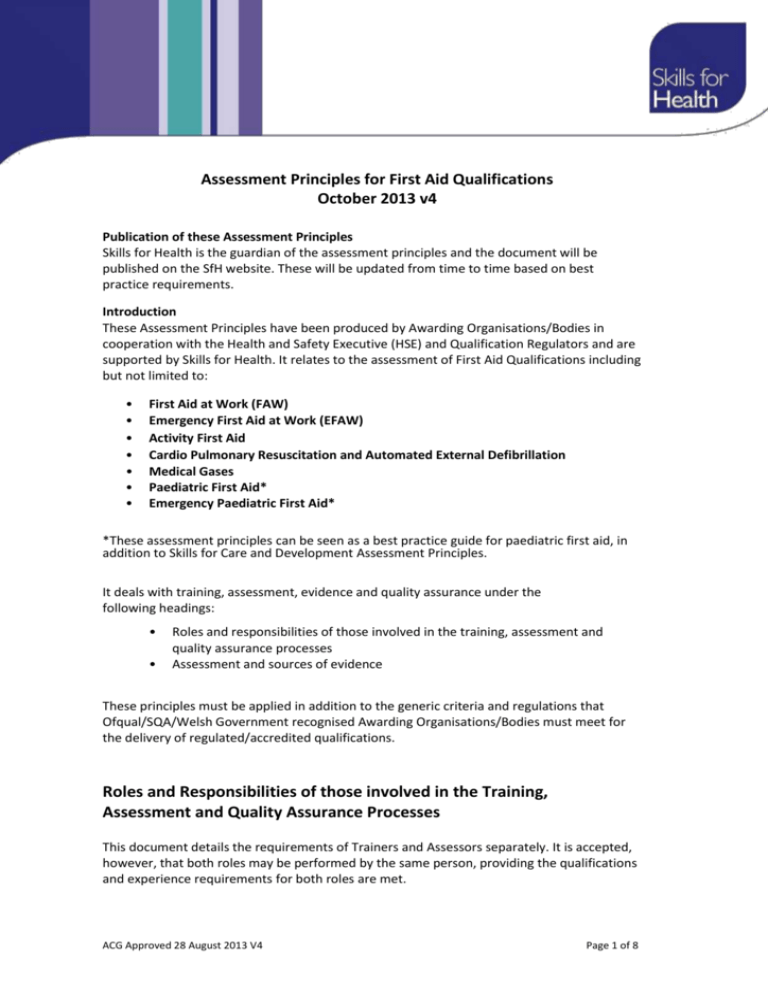
Assessment Principles for First Aid Qualifications October 2013 v4 Publication of these Assessment Principles Skills for Health is the guardian of the assessment principles and the document will be published on the SfH website. These will be updated from time to time based on best practice requirements. Introduction These Assessment Principles have been produced by Awarding Organisations/Bodies in cooperation with the Health and Safety Executive (HSE) and Qualification Regulators and are supported by Skills for Health. It relates to the assessment of First Aid Qualifications including but not limited to: • • • • • • • First Aid at Work (FAW) Emergency First Aid at Work (EFAW) Activity First Aid Cardio Pulmonary Resuscitation and Automated External Defibrillation Medical Gases Paediatric First Aid* Emergency Paediatric First Aid* *These assessment principles can be seen as a best practice guide for paediatric first aid, in addition to Skills for Care and Development Assessment Principles. It deals with training, assessment, evidence and quality assurance under the following headings: • • Roles and responsibilities of those involved in the training, assessment and quality assurance processes Assessment and sources of evidence These principles must be applied in addition to the generic criteria and regulations that Ofqual/SQA/Welsh Government recognised Awarding Organisations/Bodies must meet for the delivery of regulated/accredited qualifications. Roles and Responsibilities of those involved in the Training, Assessment and Quality Assurance Processes This document details the requirements of Trainers and Assessors separately. It is accepted, however, that both roles may be performed by the same person, providing the qualifications and experience requirements for both roles are met. ACG Approved 28 August 2013 V4 Page 1 of 8 Trainers Those involved in the training of these qualifications must have knowledge and competency in first aid as well as knowledge and competency to train based on qualifications and experience. An acceptable portfolio must show: i. Occupational knowledge and competence in first aid - evidenced by: Holding a first aid at work/medical qualification as detailed in Appendix 1 ii. Knowledge and competency in teaching/training first aid - evidenced by: Holding an acceptable teaching/training qualification as detailed in Appendix 2 AND either: Providing an acceptable log of teaching first aid within the last 3 years or Providing an acceptable record of competently teaching theoretical and practical first aid sessions under the supervision of a suitably qualified Trainer/Assessor Assessors Those involved in the assessment of these qualifications must have knowledge and competency in first aid as well as knowledge and competency to assess based on qualifications and experience. An acceptable portfolio must show: i. Occupational knowledge and competence in first aid - evidenced by: Holding a first aid at work/medical qualification as detailed in Appendix 1 ii. Knowledge and competency in assessing first aid - evidenced by: Holding an acceptable assessing qualification/CPD Training as detailed in Appendix 2 AND either: Providing an acceptable log of first aid assessments conducted within the last 3 years or Providing an acceptable record of competently assessing theoretical and practical first aid qualifications under the supervision of a suitably qualified assessor. ACG Approved 28 August 2013 V4 Page 2 of 8 Internal Quality Assurance Those involved in the internal quality assurance of these qualifications (IQA’s) must have knowledge and competency in first aid as well as knowledge and competency in internal quality assurance. An acceptable portfolio must show: i. Occupational knowledge and competence in first aid - evidenced by: Holding a first aid at work/medical qualification as detailed in Appendix 1 ii. Knowledge and competency in internal quality assurance – evidenced by: Holding a qualification/completing CPD training as detailed in Appendix 3 Internal Quality Assurers must: Have knowledge of the requirements of the qualification they are quality assuring at the time any assessment is taking place. Have knowledge and understanding of the role of assessors. Visit and observe assessments. Carry out other related internal quality assurance. External Quality Assurance Those involved in the external quality assurance of these qualifications (EQA’s) must have knowledge and competency in first aid as well as knowledge and competency in external quality assurance. An acceptable portfolio should show: i. Occupational knowledge and competence in first aid - evidenced by: Holding a first aid at work/medical qualification as detailed in Appendix 1 ii. Knowledge and competency in external quality assurance – evidenced by: Holding a qualification detailed in Appendix 4 External Quality Assurers must: Have knowledge of the requirements of the qualification they are quality assuring at the time any assessment is taking place. Have knowledge and understanding of the role of Assessors and Internal Quality Assurers. ACG Approved 28 August 2013 V4 Page 3 of 8 Assessment and Sources of Evidence Assessment Centres Assessment Centres will be responsible for maintaining up-to-date information on trainers/assessors and Internal Quality Assurers and for ensuring the currency of the competence of all those involved in the assessment and internal quality assurance process. Simulation Simulation is permitted – Each unit details what may be simulated Assessment The assessment should determine a learner’s ability to act safely, promptly and effectively when an emergency occurs at work and to deal with a casualty. All learning outcomes in the unit(s) must be achieved. Assessment may take place at any time during the delivery of the qualification and does not need to be done as a final assessment. It is however a requirement for the learner to be aware that assessment is taking place. NOTE: If undertaking the First Aid at Work qualification Unit 2 Recognition and Management of Illness and Injury in the Workplace must be completed within 10 weeks of achievement of Unit 1 Emergency First Aid in the Workplace. Standards of first aid practice Skills and knowledge must be taught and assessed in accordance with currently accepted first aid practice in the United Kingdom as laid down: by the Resuscitation Council (UK); and in other publications; provided that they are supported by a responsible body of medical opinion. E-learning For the qualifications EFAW and FAW, substitution of any of the minimum required face-toface teaching time with e-learning, blended learning or any other form of distance learning is not permitted. ACG Approved 28 August 2013 V4 Page 4 of 8 Appendix 1 Occupational Knowledge and Competence in First Aid All trainers, assessors, internal quality assurers and external quality assurers must have occupational knowledge and competence in first aid. This may be evidenced by: Holding a current First Aid at Work Certificate (issued by an Ofqual/SQA/Welsh Government recognised Awarding Organisation/Body, a HSE approved training provider or recognised equivalent*) or Holding a current Offshore First Aid Certificate issued by a HSE approved training provider or Current registration as a Doctor with the General Medical Council (GMC). Or Current registration as a Nurse with the Nursing and Midwifery Council (NMC). Or Current registration as a Paramedic with the Health and Care Professions Council (HCPC). *recognised First Aid at Work certificate equivalents must be submitted to the awarding organisation/body with comprehensive mapping which evidences that all assessment criteria of the FAW qualification have been achieved within the past 3 years. ACG Approved 28 August 2013 V4 Page 5 of 8 Appendix 2 Acceptable Training/Assessing Qualifications This list is not exhaustive but provides a guide to acceptable training and/or assessing qualifications. Trainers who also assess student competence must hold a qualification (or separate qualifications) to enable them to perform both functions. Qualification Train1 Assess2 Cert Ed/PGCE/B Ed/M Ed CTLLS/DTLLS PTLLS with unit ‘Principles and Practice of Assessment’ (12 credits) Further and Adult Education Teacher’s Certificate IHCD Instructional Methods IHCD Instructor Certificate S/NVQ level 3 in training and development S/NVQ level 4 in training and development TQFE (Teaching Qualification for Further Education) English National Board 998 Nursing mentorship qualifications NOCN Tutor Assessor Award Level 3 Award in Education and Training (QCF) Level 4 Certificate in Education and Training (QCF) Level 5 Diploma in Education and Training (QCF) PTLLS (6 credits) Accredited Qualifications based on the Learning and Development NOS 7 Facilitate Individual Learning and Development Training Group A22, B22, C21, C23, C24 SQA Accredited Planning and Delivering Learning Sessions to Groups A1 (D32/33) – Assess candidates using a range of methods A2 (D32) – Assess candidates’ performance through observation Regulated Qualifications based on the Learning and Development NOS 9 Assess Learner Achievement SQA Accredited Learning and Development Unit 9DI – Assess workplace competences using direct and indirect methods – replacing Units A1 and D32/33 SQA Accredited Learning and Development Unit 9D - Assess workplace competence using direct methods – replacing Units A2 and D32 SQA Carryout the Assessment Process Level 3 Award in Assessing Competence in the Work Environment (QCF) Level 3 Award in Assessing Vocationally Related Achievement (QCF) Level 3 Award in Understanding the Principles and Practices of Assessment (QCF) Level 3 Certificate in Assessing Vocational Achievement (QCF) 3 4 First Aid at Work Trainer course3 First Aid at Work Assessor course4 1. Trainers who do not have a formal teaching/training qualification but have considerable evidence of successfully delivering first aid training within the last 3 years may be considered. A regulated teaching/training qualification will however be required from 1st October 2015. 2. Assessors who do not hold a formal assessing qualification may alternatively attend First Aid Assessor CPD Training with an Awarding Organisation. 3. As this is not a regulated qualification, trainers will be required to achieve a formal (regulated) teaching/training qualification by 1st October 2015. 4. As this is not a regulated qualification, assessors will be required to achieve a formal (regulated) assessing qualification or attend First Aid Assessor CPD Training with an Awarding Organisation by 1st October 2015. ACG Approved 28 August 2013 V4 Page 6 of 8 Appendix 3 Qualifications suitable for Internal Quality Assurance This list is not exhaustive but provides a guide to acceptable IQA qualifications: SQA Accredited Learning and Development Unit 11 Internally Monitor and Maintain the Quality of Workplace Assessment Regulated Qualifications based on the Learning and Development NOS 11 Internally Monitor and Maintain the Quality of Assessment Level 4 Award in the Internal Quality Assurance of Assessment Processes and Practice (QCF) Level 4 Certificate in Leading the Internal Quality Assurance of Assessment Processes and Practice (QCF) V1 or D34 SQA Internally Verify the Assessment Process NOTE: IQA’s who do not hold a formal IQA qualification may alternatively attend Internal Quality Assurance CPD Training with an Awarding Organisation. It is understood that not all IQA’s will hold formal IQA qualifications or have attended CPD Training initially, though one of the above should have been achieved by 1st October 2015. During this time Awarding Organisations and Centres must ensure that IQA’s are following the principles set out in the current Learning and Development NOS 11 Internally monitor and maintain the quality of assessment. ACG Approved 28 August 2013 V4 Page 7 of 8 Appendix 4 Qualifications suitable for External Quality Assurance This list is not exhaustive but provides a guide to acceptable EQA qualifications: SQA Accredited Learning and Development Unit 12 Externally Monitor and Maintain the Quality of Workplace Assessment QCF Qualifications based on the Learning and Development NOS 12 Externally Monitor and Maintain the Quality of Assessment Level 4 Award in the External Quality Assurance of Assessment Processes and Practice (QCF) Level 4 Certificate in Leading the External Quality Assurance of Assessment Processes and Practice (QCF V2 or D35 SQA Externally Verify the Assessment Process It is understood that not all EQA’s will be qualified initially, and that sufficient time should be considered to achieve these qualifications. During this time Awarding Organisations/Bodies must ensure that EQA’s are following the principles set out in the current Learning and Development NOS 12 Externally monitor and maintain the quality of assessment. ACG Approved 28 August 2013 V4 Page 8 of 8
